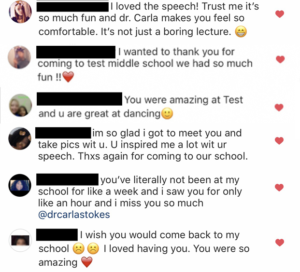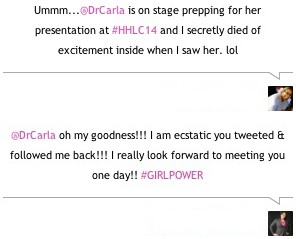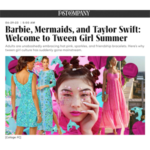I love the Sesame Street “I Love My Hair” video because it aims to teach young girls about self-acceptance while building positive self-esteem. However, my initial reaction was, “Where was this video when I was struggling to figure out why my dolls didn’t look like me?” NPR reported that the video aired on the October 4 episode of Sesame Street and was created by Joey Mazzarino, an Italian father of an Ethiopian daughter, who is the head writer at Sesame Street. Mazzarino created the video to encourage his daughter to celebrate her hair and it has now become an Internet sensation.
Although there has been a considerable amount of discussion about the video’s positive implications for Black girls, it also has a universal message regarding the diversity of beauty that all girls and even boys can benefit from. It was refreshing to watch the Sesame Street video after being exposed to so many years of TV programming that promotes the message that women and people of color must transform their appearance in order to conform to mainstream beauty ideals that celebrate fair skin, blonde hair, and blue eyes. However, after the buzz dies down, television networks must continue to be held accountable for their role in disseminating media messages that harm children’s self-esteem and overall health.
While the “I Love My Hair” video is a step in the right direction, there is still a lot of work to be done to counteract the negative impact that these pervasive images have on girls’ and boys’ body image, self-esteem, and perceptions of beauty. Children of color need to see themselves reflected in the media in positive ways on an ongoing basis. To this end, the “I Love My Hair” video will have a bigger impact if it inspires more positive media programming and media literacy education for children. Sesame Street can continue to counteract harmful programming by giving this lovable brown-skinned muppet a permanent and progressive role in the Sesame Street cast that shatters stereotypes about Black girls (as long as she’s not relegated to the role of blonde-haired Prairie Dawn’s sassy, booty shaking, gold digging, sidekick).
Click here for ABC News coverage regarding the “I Love My Hair” video sensation.
Grown folks: Beware that if you watch this video too many times it may get stuck on auto-loop in your head. Over the weekend, I caught myself singing “don’t need a trip to the beauty shop, ’cause I love what I got on top….” while doing the dishes.
And speaking of hair whipping and being grown, check out the Sesame Street “I Love My Hair”-Willow Smith “Whip My Hair” Mashup:
I have a hunch that this version will probably be more appealing to girls than the original Sesame Street version (at least until they see Willow Smith’s new “Whip My Hair” video). I love that this song encourages girls to have the courage to honor and celebrate their authentic selves without fear of judgement:
“I Love My Hair” Conversation Guide: Real Talk for Parents and Concerned Adults
I recently watching a disturbing video of a mother violently brushing her daughter’s hair, while verbally abusing her and inevitably damaging her self-esteem. The social worker in me wanted to call DFACS and jump through my laptop. Even though I couldn’t tolerate more than 15 seconds of the video, it reminded me of how fortunate I was to grow up with loving, kind, and emotionally stable parents who expressed their love for me regularly, including while they groomed and styled my hair.
After reading some of the responses to the video, it became painfully obvious that in addition to learning effective hair detangling techniques, many parents and guardians need to be taught healthy ways to build their children’s self-esteem. Unfortunately, some parents and caretakers project negative attitudes and behaviors that they learned during their own childhood onto their children. It is critical that parents take responsibility for breaking this damaging cycle in their households as early as possible in their children’s lives to protect their developing self-esteem. Sadly, it is necessary to remind some parents that just because they may have had a troubling childhood, this is not an excuse to jeopardize their children’s physical and emotional health.
Parents who think that this mother’s behavior is funny or engage in similar behaviors with their children while styling their hair (i.e., threatening them, yelling obscenities, or chastising them for objecting to the pain that they are inflicting on their scalp and psyches), need to be educated about proper hair care techniques (there are tons of online tips and YouTube videos that demonstrate detangling methods) and should consider seeking professional counseling and/or enrolling in parenting classes. I also recommend that all parents take the time to explore how their own childhood experiences and attitudes about hair and beauty may be shaping their interactions with their children. If you feel uncomfortable or defensive as you read this section, I strongly encourage you to take an honest and objective look at your parenting practices. Put yourself in your children’s shoes and consider how they may feel when you interact with them.

As a girls’ empowerment coach, I help parents/guardians build their daughters’ self-esteem and counteract the harmful effects of media. In my work as a speaker and educator, I often utilize popular culture as a tool for sparking discussion and critical thinking about a range of issues that are relevant to youth and girls. The Sesame Street video provides a great opportunity to start a dialogue about self-acceptance and body image. To help celebrate your daughter’s uniqueness and boost her self-image, I created a brief conversation guide for parents, relatives, and concerned adults to use in conjunction with the “I Love My Hair” video.
Fill out the form below to download my Real Talk for Parents ™ Self-Esteem Kit for Parents, which includes the “I Love My Hair” Conversation Guide and 10 Tips to Boost Your Daughter’s Self-Esteem and Body Image (for girls of all ages).
PART II: READ MY LATEST BLOG ABOUT MY “I LOVE MY HAIR” JOURNEY
Natural Hair Care Blogs and Books
There are a lot of great blogs and books about natural hair care, but these are some of my favorites:
- Follow my “Big Natural Hair” inspiration board on Pinterest
- The Science of Black Hair by Audrey Davis-Sivasothy (Excellent book about healthy black hair care!)
- Curly Nikki
- Curly Like Me: How to Grow Your Hair Healthy, Long, and Strong by Terri LaFlesh
- Beads, Braids and Beyond (Children’s natural hair care and styling) I wish this site was around when I was a little girl!
- How to Detangle Black Hair
- Sweet Honey Child – This line of products celebrates the beauty and uniqueness of brown-skinned children.
Related Body Image Resources:
- Sign up for my E-mail newsletter and follow me on Facebook and Twitter to receive resources and tips for young women, parents, girls, and girl advocates.
- Dr. Carla’s “I Love My Hair” Conversation Guide & Real Talk™ Self-Esteem Kit for Parents of Girls
- Read my book chapter in “Girl Wide Web 2.0: Revisiting Girls, The Internet, and the Negotiation of Identity” for a research-based exploration of how Black adolescent girls navigate beauty ideals online.
- 101 Ways to Help Your Daughter Lover Her Body by Brenda Lane Richardson and Elaine Rehr
- “You’d Be So Pretty If….Teaching Our Daughters to Love Their Bodies – Even When We Don’t Love Our Own” by Dara Chadwick
- “I Love My Hair” by Natasha Anastasia Tarpley (children’s book)
- “Perfectly You” by Julia V. Taylor (children’s book)





 Facebook
Facebook Twitter
Twitter LinkedIn
LinkedIn Pinterest
Pinterest Youtube
Youtube Instagram
Instagram